Last week, not only the price of bitcoin fell by 21%. Over the past year, the value of the world’s largest cryptocurrency has fallen by more than 70% amid the “crypto crash” that marked the rapid decline of the entire digital currency market this year.
What does President Bukele do? Buy more.
Based on the argument crypto evangelists who assure that this is the best time to invest in digital currency, precisely because it is undervalued, the president continues to promise to turn his country into a bitcoin paradise, although it has been a little more than a year since the small Central American country accepted cryptocurrency as “legal tender” September 7 last year.
we buy one #Bitcoin every day starting tomorrow.
— Nayib Bukele (@nayibbule) November 17, 2022
Secret of public funds
While it is nearly impossible to know how much bitcoin the El Salvadorian government has purchased with public funds from all taxpayers, experts estimate that tax losses could be around $70 millionbased solely on the messages that Bukele posts on his Twitter account each time he announces a purchase.
Sources interviewed by BBC Mundo believe that the losses are much greater if you add the fiscal resources used to implement the bitcoin law, which amount to about $200 million spent on creating a digital wallet for storing cryptocurrency. , trust or ATMs designed for digital currency transactions.
“This is an experiment that combines a high dose of improvisation and a high dose of opacity,” economist Ricardo Castaneda told BBC Mundo. older Central American Institute for Financial Studies, ICEFI.
“In any moderately democratic society, it would be inconceivable that citizens do not know how public resources are being used, or that officials are not accountable.”adds analyst.
El Salvador has been under a state of emergency restricting individual freedoms since March 27. BBC Mundo contacted the government to communicate its vision for investing in bitcoin, but received no response.
FTX scandal
The final blow to the cryptocurrency industry came with the recent collapse of FTX, a company that has become the second largest platform for buying and selling cryptocurrencies in the world. Its brutal fall exacerbates other bankruptcies that continue to undermine a market that many experts consider a bubble.
At the center of the crisis is former FTX chief executive Sam Bankman-Fried, who stepped down after the firm filed for bankruptcy. Today there is a judicial investigation into financial transactions company and the disappearance of at least US$3,000 million.

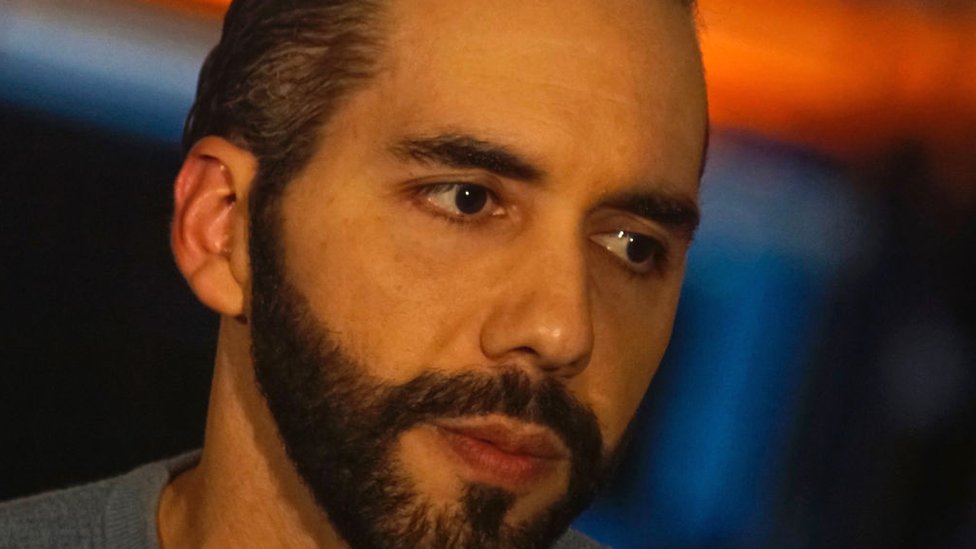

After the FTX fiasco and the sharp drop in the price of bitcoin, Bukele came out in defense of the cryptocurrency on his Twitter account: “The bitcoin protocol was created precisely to prevent Ponzi schemes, bank runs, rescue and redistribution of wealth from Enron, WorldCom, Bernie Madoff. , Sam Bankman-Fried.
“Some understand, others don’t yet.”
FTX is the opposite #Bitcoin #Bitcoin The protocol was created specifically to prevent Ponzi schemes, bank runs, Enron, WorldCom, Bernie Madoff, Sam Bankman-Fried…
… saving and redistributing wealth.
Some people understand this, some don’t.
We’re still early.🌎/21m
— Nayib Bukele (@nayibbule) November 14, 2022
The president, who has an 87% approval rating in a CIDGALLUP poll, argues that the country has not lost public funds because as long as bitcoin is not traded, there is no real loss of money.
The logic behind the explanation is that the way the stock market works, if the stock price falls, the investor does not lose his money until he sells it.
In El Salvador, where one in four lives in poverty, half of the population is food insecureWith three out of 10 kids out of the school system and rural areas with limited internet connectivity, it’s hard for them to follow the twitter discussion on the subject, especially when the president’s bitcoin messages are posted in English.
Relive the Volcano Bonus
Over the past year, the government has twice announced its intention to increase the country’s external debt through the issuance of bonds.
But this is not about the typical bonds that countries issue to finance themselves. This is the so-called “volcanic bond”, which allows you to get into debt in bitcoins.

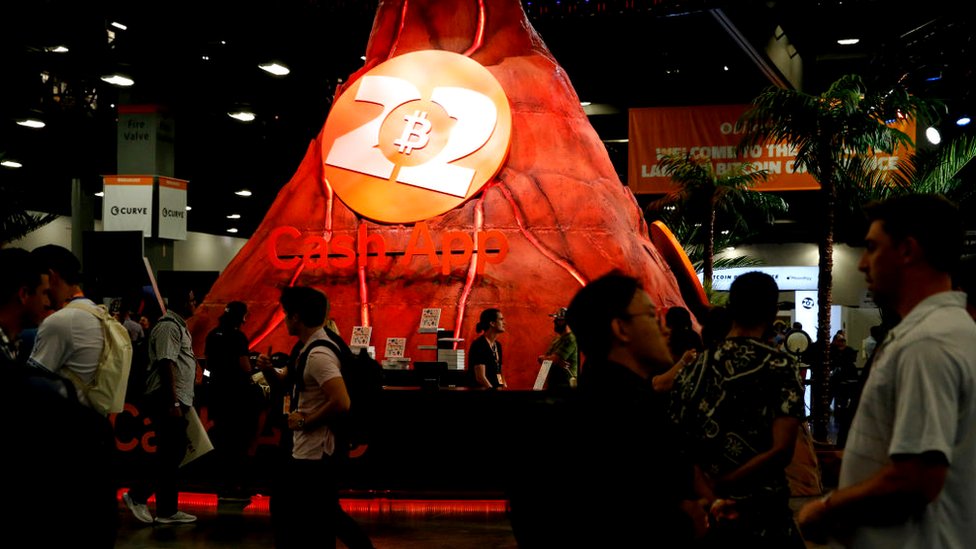

The government first announced that it would take on bitcoin debt in March of this year, but that never happened. Then he said that the broadcast would be in September, but it never took place.
This Thursday, he announced for the third time that he would take out a bitcoin loan, sending a bill to Congress – with an official majority – to issue (or) deferred bonds.
These bonds will theoretically raise $500 million to fund the creation of a tax-free “futuristic” city called Bitcoin City at the feet Conchagua volcanoand another $500 million to buy more bitcoins.
Hence the name “volcanic connection”.
If this time the country finally issues a bond and if international investors buy it, then El Salvador will be the first country to borrow in bitcoin, which will increase it gigantic public debt which currently borders on 85% of gross domestic product (GDP).
bitcoin experiment
In an economy that has been dollarized for two decades, the government has tried to convince Salvadorans to do everything in bitcoin, from buying milk at the corner store to sending remittances from the United States.

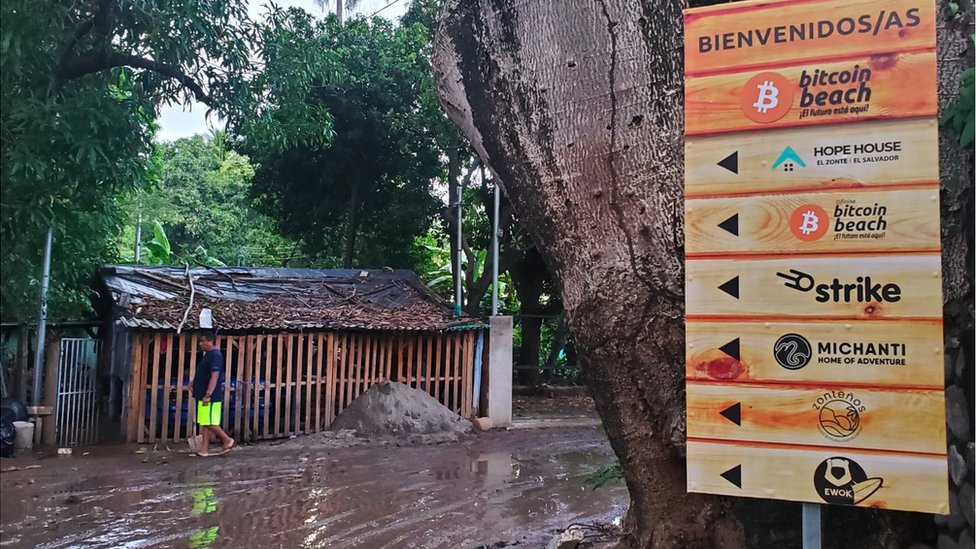

Even canine hospital was established in San Salvador, ChivoPets, with big discounts for those who pay in bitcoin instead of dollars.
The government has also given every Salvadoran a $30 bonus for downloading an app that allows them to transact in bitcoin.
Many collected US$30 and never used it again.
Abroad, Bukele continues to promote “B.itcoin B.each” in El Zonte, a small fishing village with two faces: tourist hotels and dilapidated houses set on dirt roads that become impassable due to mud when it rains, BBC Mundo confirmed during a trip to the area.
Analysts estimate that just over a year later, only 2% of remittances from the US are sent in bitcoin and that the vast majority of the population does not use the digital currency.
A survey conducted by the Central American University. José Simeon Cañas and published in October showed that 65.5% of the population believe that Bitcoin adoption was a failure and 77.1% said the government should not continue to spend public money on cryptocurrencies.
“The system didn’t work,” says Salvadoran economist and consultant Tatiana Marrochino, speaking to San Salvador-based BBC Mundo.

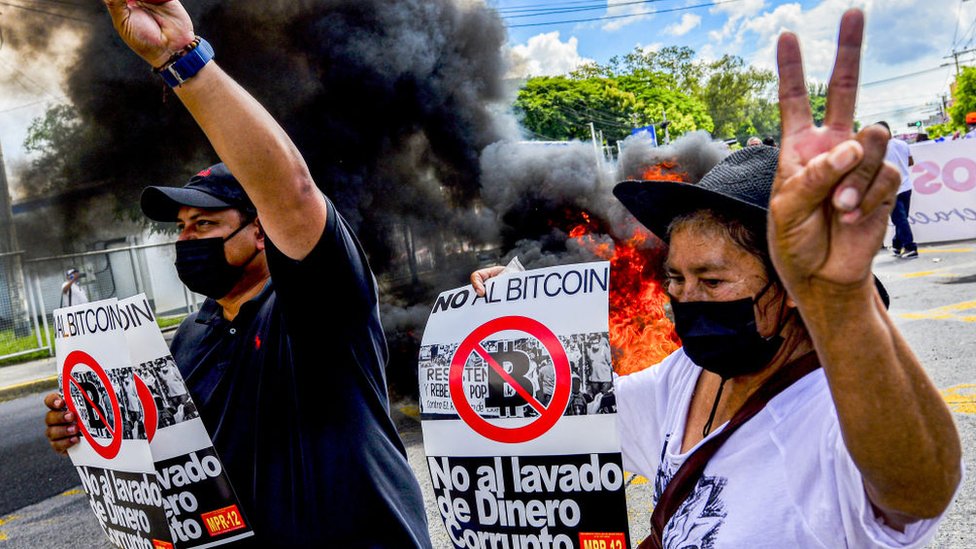

“Very little transparency. It’s one thing that the price of bitcoin has fallen, but what worries me the most is the mess and irresponsibility with which public funds are being managed,” he notes.
“And one of the consequences of the lack of transparency is that it is harder for the country to get funding,” he adds.
Rating agencies Fitch Ratings, Moody’s and Standard and Poor’s downgraded the country’s risk rating this year, leaving El Salvador with access only to loans at extremely high rates.
Chinese factor
With the debt due in January approaching the $667 million the country must repay to international investors, a new player has entered the field: China.
The governments of El Salvador and China have just announced the start of negotiations for a Free Trade Agreement between the two countries.
As those talks continue, El Salvador’s vice president Felix Ulloa said the Asian giant was offering to buy the country’s debt, but warned that they are not going to sell it “first buyer.

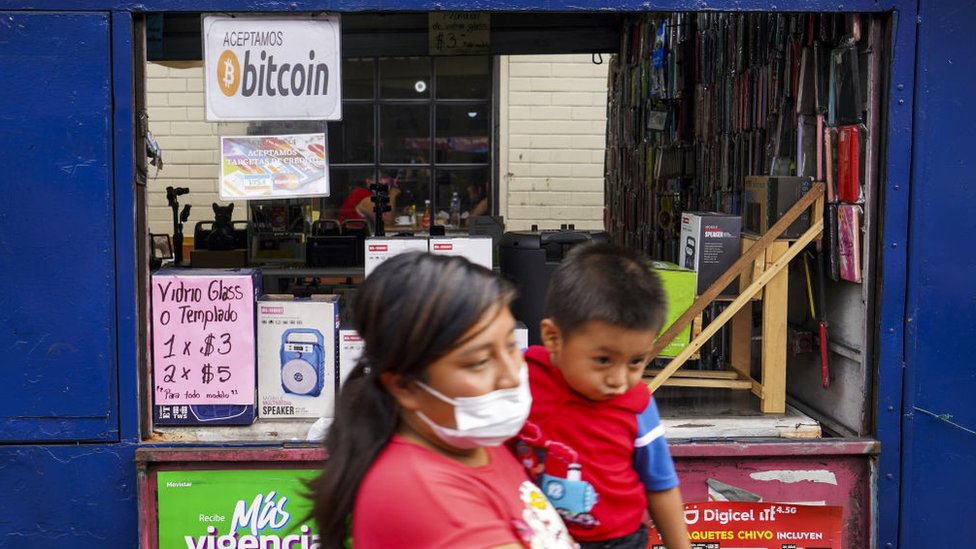

Regardless of whether any deal with China is finalized, public debt is one of the problems weighing on the country, and while the president argues that funds invested in bitcoin do not have a greater impact on public accounts, the opposition argues that the deficit budgetary resources should be directed to financing social programs, and not to high-risk assets.
More broadly, some analysts believe that economic problems are not the only factor affecting the country’s image abroad and, therefore, its funding opportunities.
According to Castaneda, the equation also affects “democratic weakening”the president’s desire to be re-elected in 2024 – despite the fact that the Constitution does not allow – and the lack of information about financial transactions.
“In El Salvador, the president controls almost the entire institutional structure, from the Legislative Assembly to the judiciary, so if he decides that this information is confidential, there is no possibility of appeal,” he argues.
“The president is like a person who goes to a virtual casino to place bets,” he says. “The difference is that you don’t play with your own money, but rather stakes on the money of the entire population“.
At this point, it is impossible to know if the “crypto crash” has already bottomed out, if bitcoin will continue to go down or if at some point its price will rise again, as its followers believe.
How long will Bukele keep buying bitcoins? The answer can be found in the messages he posts in English on his Twitter account.
You can now receive notifications from BBC Mundo. Download the new version of our app and activate them so you don’t miss out on our best content.
Source: La Opinion
Alfred Hart is an accomplished journalist known for his expert analysis and commentary on global affairs. He currently works as a writer at 24 news breaker, where he provides readers with in-depth coverage of the most pressing issues affecting the world today. With a keen insight and a deep understanding of international politics and economics, Alfred’s writing is a must-read for anyone seeking a deeper understanding of the world we live in.
